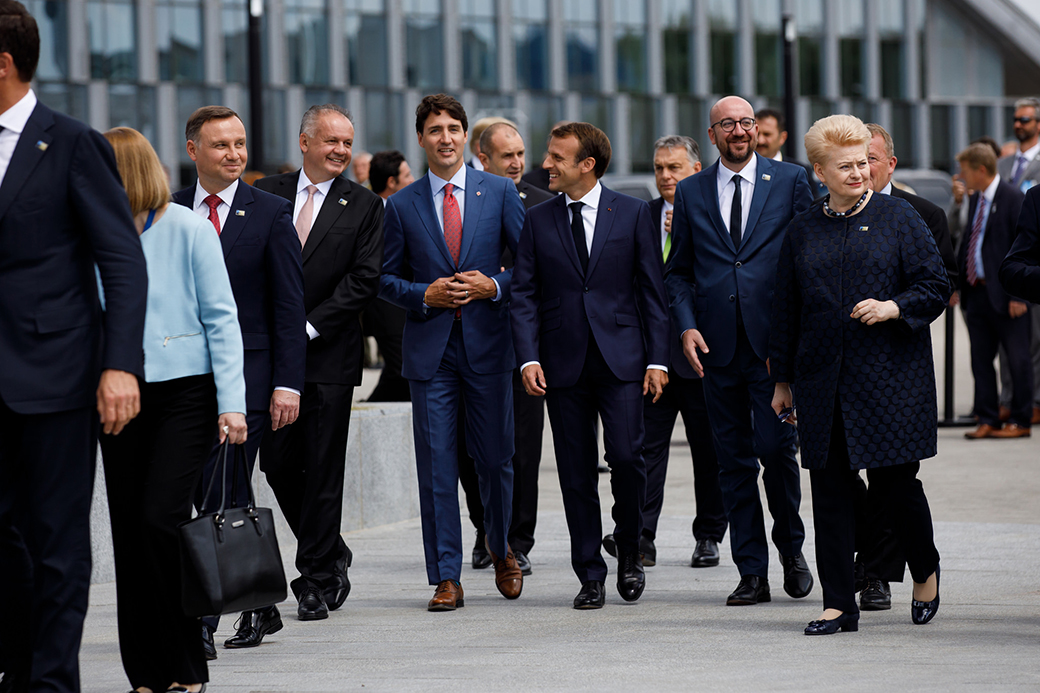It was like India, part two: Justin Trudeau’s flamboyant nature asserting itself again. Look at the animation on his face, he’s flying. None of the others there can remotely match it. He loves being social, it’s the opposite of his dad, as he’s said, and it drew him into public life when he realized it.
He’s been self-disciplined since the election, quiet, not burbling — it couldn’t last. He’s a big kid, as are most people under the surface. The suits and deep voices only conceal it. If you look at any illustrious macher you can almost always see the child crouching within. (If we lived till 300, maybe we’d outgrow childhood, maybe not.) Trump perches on his seat like a kid at circle time.
But more power to Justin, he’s simply less suppressed. I don’t think it’ll hurt passage of the USMCA. Trump needs that deal even more than Trudeau, to offer to workers and farmers in the states that put him over the top in 2016.
But this is where the real problem begins. The embarrassment isn’t in what Trudeau said about Trump, it’s what he said about NATO when he spoke the next morning to clean up the mess, with his grown-up face on, and said Canada was playing a big, serious NATO role, especially in Lativa and Iraq.
Never mind the Mideast — I mean how near the North Atlantic are Iraq or Afghanistan? But in places like Latvia, NATO’s at the heart of a nuclear crunch that may decimate humanity before climate change gets a chance to. How so?
When NATO was formed 80 years ago, solely to allow the West to militarily “contain” the Soviet bloc, who’d have thought it would outlast the Soviets by 30 years? Nobody! NATO’s been a big armed blob in search of a purpose ever since, but those Cold War origins have come back to haunt it — this very year.
As the Soviet Union receded into Russia, starting in 1989, its main worry was German reunification. They’d lost a staggering 20 to 40 million dead in defeating Hitler and wanted assurances that they wouldn’t face another round.
So a deal was done. Russia would accept German unity with U.S. “ironclad guarantees,” that NATO wouldn’t advance “one inch eastward.” (You can find details in, say, the L.A. Times.) U.S. big minds soon realized though, that nothing but their solemn promises stopped them from taking control in eastern Europe, and in a few years Poland, Hungary, the Czechs, Latvia etc. had joined NATO. Even the drunk Russian leader, Yeltsin, who was kept in power by U.S. money and support, objected. Putin, who was clear-headed, far more so. Ukraine was the capper. It had been the Soviet “breadbasket,” was the original Russia (Kievan Rus) and right on its border. Now NATO loomed there.
In response, Russia began upgrading its nuclear weaponry — virtually the only card it has to play. During the Cold War, several nuclear arms control treaties had been signed. So, responding to the Russians, the U.S. cancelled a key treaty, the INF, which had eliminated whole categories of nukes, thousands at a time. It died last January. (But isn’t Trump pro-Russia? Yes, rhetorically, among other inexplicable insights he occasionally exhibits. But the rotating adults in the room talked him down from it and in practice he’s been as anti-Russian as anyone.)
For 30 years, the INF had decreased the number of nukes that might, even accidentally — especially accidentally — incinerate us. Now the U.S. is ready to spend $1.2 trillion on multiplying nukes during the next 30 years. Thanks, NATO.
I’m not saying if NATO didn’t exist, the U.S. wouldn’t have found other ways to expand eastward, but it would’ve been less convenient. Nor am I saying countries like Ukraine don’t have reason to fear the Russians, just as the Russians have their own historical reasons to fear Germany.
But humanity survived, by luck and some treaties, numerous decades of potential ruin, sometimes due to individuals with common sense, often at lower levels, who stubbornly refused to follow ordained procedures for unleashing Armageddon.
Rick Salutin writes about current affairs and politics. This column was first published in the Toronto Star.
Image: Adam Scotti/PMO




